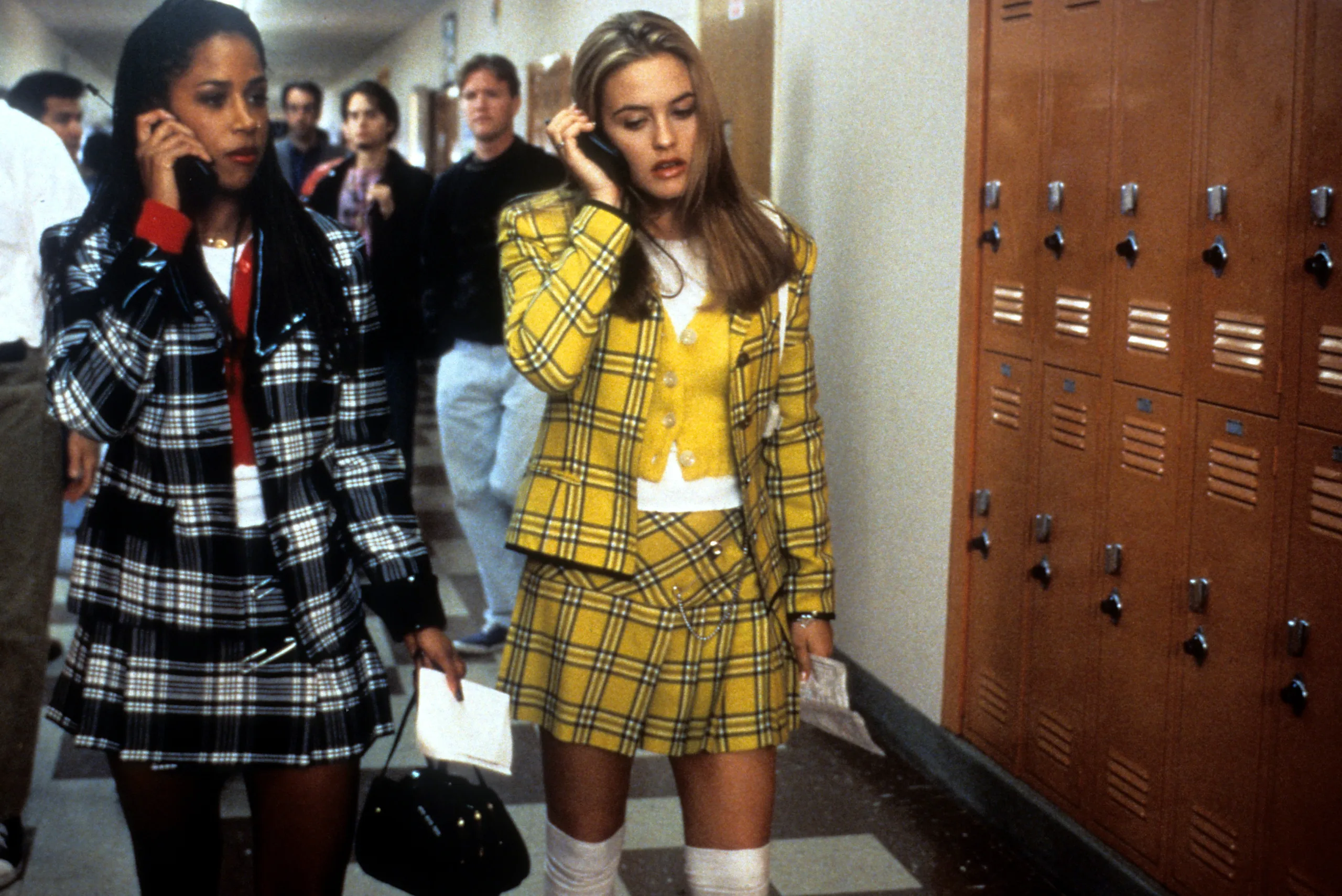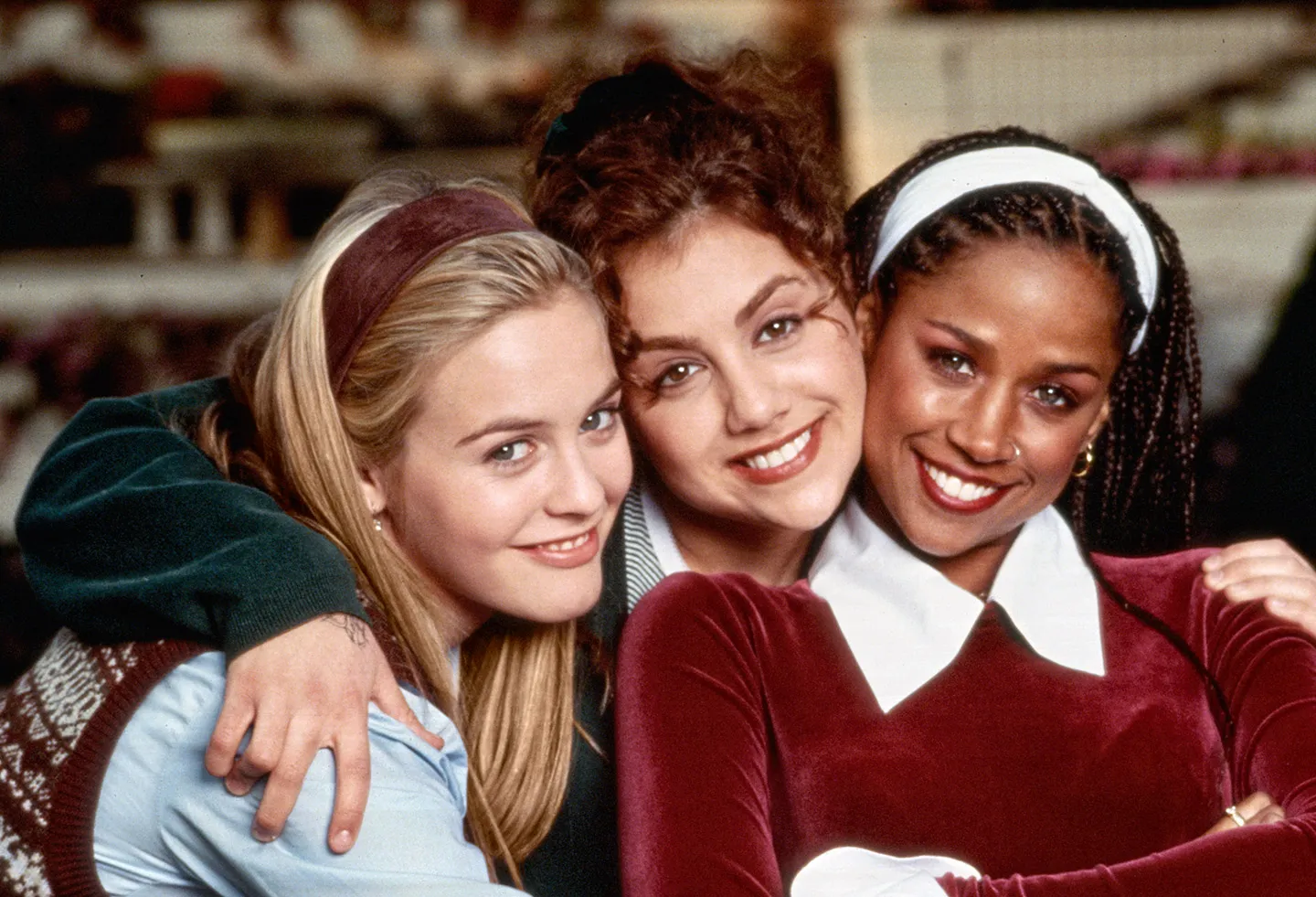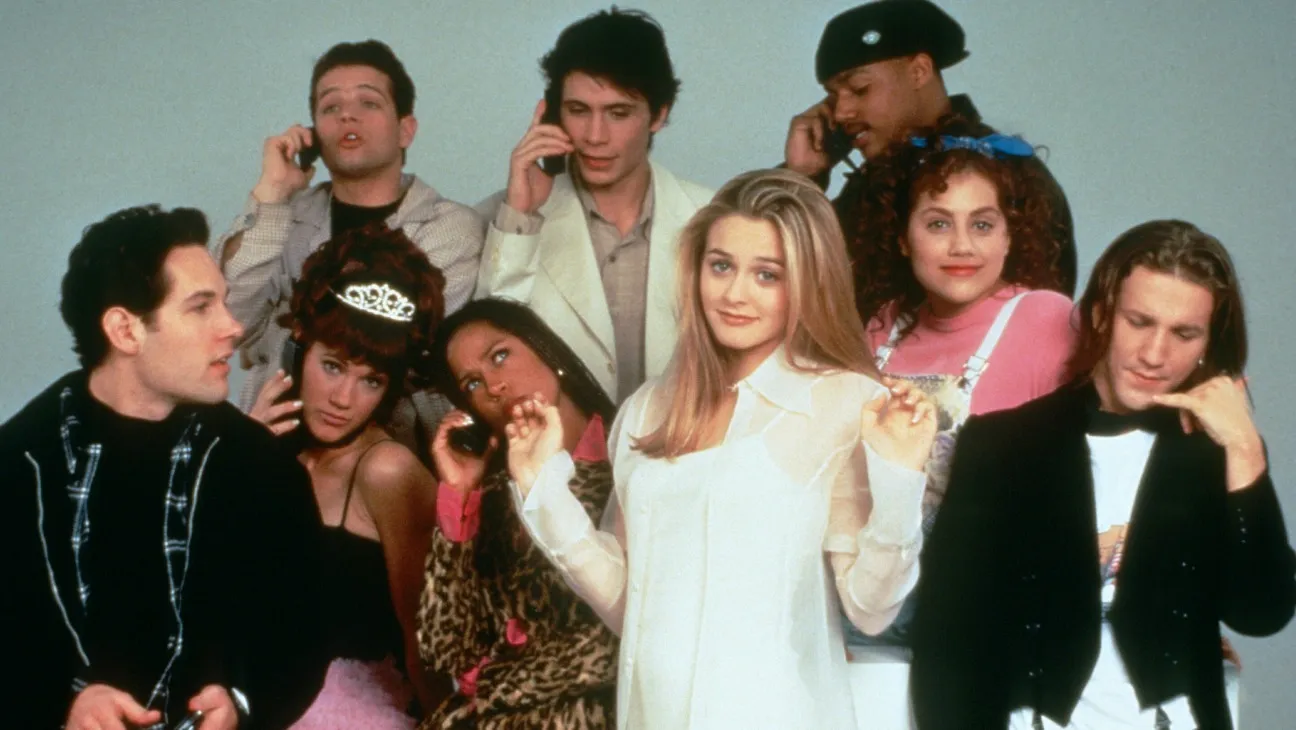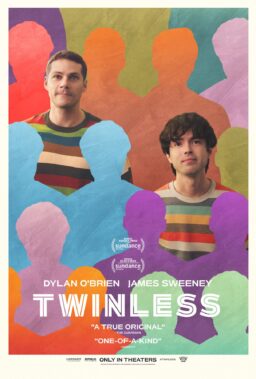Writer-director Amy Heckerling’s 1995 comedy “Clueless” is almost twice as old as its heroine, Beverly Hills princess Cher Horowitz (Alicia Silverstone). It’s a period piece now, which is fine, because it’s also true of its inspiration, Jane Austen’s 1816 novel Emma. The teenage characters all have cellular phones, which were rare at that time compared to today. Mona May’s dazzling costumes, which should have been a lock for that year’s Oscar, are mid-90s fashion run through an MTV glam filter and pumped up on steroids, from the brightly colored, plaid-patterned jacket, vest, and skirt ensembles that Cher and her friend Dionne (Stacey Dash) wear in the opening scene and the baggy jeans and backwards ball caps favored by skater boy Travis (Breckin Meyer) and his buddies, to the Seattle grunge look preferred by Cher’s stepbrother Josh (Paul Rudd).
There’s no everyday Internet usage yet, hence no smartphones, which means the characters get lost while driving, take Polaroids of each other while shopping for clothes, and have to call an operator and ask for the number of a taxi service when stranded. Mark Wahlberg, two years out from “Boogie Nights,” was known as a rapper and underwear model, and is name-checked as Marky Mark.
But in its portrayal of the eternal verities of adolescence, “Clueless” hasn’t aged a day. In that sense, it stands proudly alongside Austen’s novel, which has been adapted many other times for film and TV because it’s so appealing that it’s almost impossible to mess up. (Just a year after “Clueless,” there would be two more film adaptations: a theatrical feature starring Gwyneth Paltrow, and a TV movie starring Kate Beckinsale.) Cher is a reimagining of Austen’s heroine, would-be matchmaker and rich man’s daughter Emma Woodhouse. Most of Heckerling’s Beverly Hills characters have counterparts in the book.
But the end product stands apart from the work that inspired it and is equally quotable, from Cher’s defense of her virginity (“You see how picky I am about my shoes, and they only go on my feet”) to the conclusion of her “pro” defense during a classroom debate on immigration policies (“There is no RSVP on the Statue of Liberty”). Watching it again recently, I was amazed by how tightly plotted and fast-paced it was. The voice-over narration, which has a touch of The Catcher in the Rye, gives “Clueless” the freedom to insert brief, quasi-anthropological observations that are illustrated with delightful images, like Cher’s description of Travis’ subculture appearing over shots of them power-walking across campus with terrible posture: “So okay, I don’t want to be a traitor to my generation and all, but I don’t get how guys dress today. I mean, come on, it looks like they just fell out of bed and put on some baggy pants and take their greasy hair—ew—and cover it up with a backwards cap, and like, we’re expected to swoon? I don’t think so.”

Those kinds of moments are hilarious and ring true, and therefore require no other justification for their inclusion. But they’re sneakily functional, too, in that they add still more definition to the vivid world the film has created, and flesh out characteristics of the school’s subgroups, whether they’re Cher’s band of to-the-manor-born young women (they would be called Heathers or Mean Girls if they weren’t essentially decent) or wealthy Black kids like Dionne who feel pulled in different directions.
It’s a nuanced script that sees things that most high school movies don’t and has the nerve to call them out. Notice that Dionne is comfortable dressing and talking like Cher, but her boyfriend Murray, played by Donald Faison, craves street-level “authenticity,” which leads him to shave his head and say things like “You jeepin’ behind my back?”, sparking rebukes from Dionne, who accuses him of playacting. “Street slang is an increasingly valid form of expression,” Murray insists. (A Black kid in Beverly Hills named “Murray” seems like an additional bit of character-building; even the layers in the movie have layers.)
None of it would work if Heckerling didn’t have a beguiling movie star in the form of Silverstone, who was barely known a year earlier but became a box office name thanks to “Clueless” and has worked constantly ever since. (Just this year she starred in the psychosexual thriller “Pretty Thing.”) You could put her performance as Cher in the dictionary next to “irresistible.” That’s important because, as the script is fully aware, this girl is privileged as hell, and isn’t nearly as self-aware about it as she thinks she is. She thinks “Mexican” is a language, and her defense of a progressive immigration policy is couched in a weird analogy about planning a garden party. She’s a terrible driver who scrapes a parked car during a test and doesn’t stop until the instructor commands it. “You want to practice parking?” Josh asks her. “What’s the point?” Cher says. “Everywhere you go has valet.”
But she truly has a good heart, which is why she’s constantly trying to maneuver others into relationships that might bring more happiness into their lives, and volunteering to give fashion-challenged cohorts a makeover—notably a new girl named Tai (the late, great Brittany Murphy), who’s rough around the edges. Tai fancies Travis but keeps getting steered towards the self-satisfied rich boy Elton (Jeremy Sisto), a cad who wants Cher and repeatedly tries to kiss her in the parking lot of a gas station until she flees the vehicle (and gets robbed at gunpoint soon after).

Cher, meanwhile, has far poorer radar for her own prospects than she has for other people’s. Josh is a perfect fit for her, and he’s a viable romantic prospect because even though they grew up together, they aren’t related (this is probably the most 19th-century touch in the movie, besides the use of the phrase “minor ducats”). Still, they are both oblivious to their blatantly mutual attraction. Cher instead chases the handsome transfer student Christian (Justin Walker) even though he is obviously, as Murray puts it, “a disco-dancing, Oscar Wilde-reading, Streisand ticket-holding friend of Dorothy.” On top of Cher’s inability to see what’s right in front of her, Heckerling gets additional comic mileage but assuming that we’ve already figured out Christian’s orientation, if not from the way he walks into Cher’s classroom for the first time–like he’s modeling for a catalog–then from the way he reads William S. Burrough’s novel Junky in class and would rather watch “Spartacus” than swim with her.
Another factor contributing to the film’s timelessness is the relationship between Cher and her father, Mel (Dan Hedaya), a widowed and then divorced Beverly Hills lawyer whose gruff New York facade hides a heart as big as California. Theirs is one of the most appealing father-daughter relationships in cinema. I get a bit misty every time I watch the scene where Cher laments her inability to land Christian, telling Mel, “I like this boy, but he doesn’t like me!” and Mel growls, “How can this be?”
They love each other deeply and know each other well. When Cher reveals that she bargained her way from a C average to a B by relentlessly hassling her teachers, Mel crows, “Honey, I couldn’t be happier than if they were based on real grades!” They’re both kooks who think they’re the baseline for determining normalcy—like everyone else in the movie, really. All great comedies have this in common, and “Clueless” is one of them.












